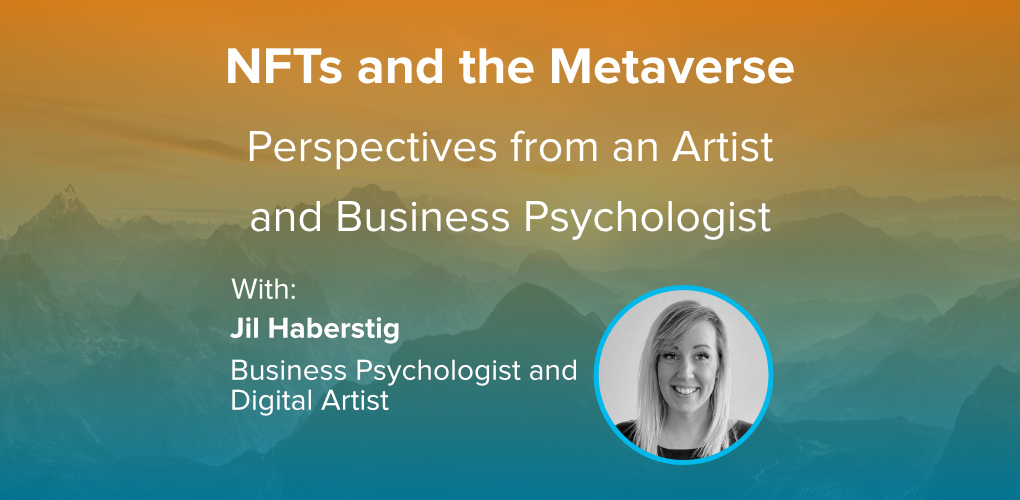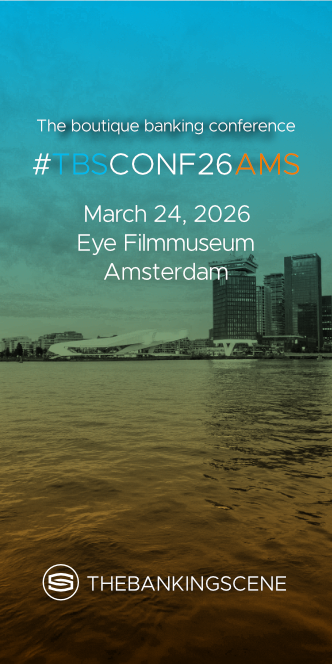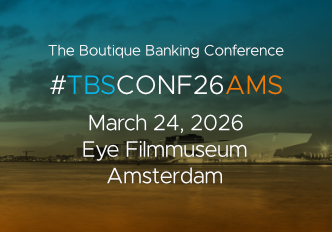
Insights & Opinions
NFTs and the Metaverse: Perspectives From an Artist and Business Psychologist
Tue, 15 Feb 2022


On 10 February, we held our fourth session on NFTs and the Metaverse, for which we invited Jil Haberstig, not the regular financial or technological wizard but a business psychologist and digital artist.
Jil is also the founder of the Luxembourg NFT community and is actively researching and analysing how the Metaverse will change the way humans behave and how it will impact societal cohesion and mental rest.
NFTs are here to stay
The session started with a poll to determine how the audience feels about NFTs. "Maybe it is overhyped, but it is here to stay" was the most popular vote, followed by "It will only grow in 2022." Given the steep rise in press attention over the last few months, these are surprising results, in my opinion, as my belief is that we are experiencing a real hype and to me, it remains unclear how this ends up.
Jil, on the other hand, agreed that NFTs are here to stay.
During The Banking Scene Art Night, back on October 28, 2021, the audience had the chance to attend a nocturn on David Hockney's iPad art. Probably the biggest artist on earth still alive is not a fan of NFTs. In an interview, he shared: "I think it's ICS: International Crooks and Swindlers. What is it that they're owning? I don't really know."
In response to this, Jil explained that she understood his point of view. "There's a difference between NFTs and NFT art. The huge hype that we are seeing right now is not about art, it's about NFT projects, and we have to start differentiating it from art", Jil explained.
"For artists, definitely I agree with him - I guess that's what he meant - it's almost unbearable to see all of the AI-generated pictures to be considered as art. Seeing all this almost hurts physically."
OK, let's limit the discussion in the rest of this article to art NFTs. What makes NFTs so valuable to artists, to people creating new emotional concepts in the form of digital art?
Redefining art royalties with NFTs
NFTs are a form of smart contracts that can include the way royalties work. Jil explained: "Whenever an artist sells an NFT, they can decide how much percentage they get. If the artwork is selling again, like on a secondary market, we get a certain percentage of the sale."
This is quite unique, as it adds additional value to artists whose art is used for investment purposes because the market believes in their talent. Artists can even make a living from the early works through this mechanism once they make a name in the art scene.
Andrew Vorster jumped in, explaining a new service at CES a few years back. There was a digital picture frame to hang on the wall at home, and the company that offered it had agreements with major museums so people could hang famous art in their living room. Of course, these people had loyalties to pay back to the museum.
Linking both together, you could easily see how the digital art of less known artists on digital marketplaces like Opensea could be shared the same way with rules in the smart contract clearly stating how to deal with royalties. The moment artists get more famous, they can keep enjoying their early works through royalties on a resell.
Art in your virtual living room
The digital picture frame brings digital art to your living room, but perhaps more common is to have digital art in your digital living room. After all, your house in the Metaverse also deserves some beauty and exclusivity, doesn't it?
Since houses in Sandbox cost about as much as a house in the real world these days, you'd better go full-option, no?
It remains to be seen how this world in Sandbox evolves and whether it becomes a mainstream thing instead of a new Second Life. If you're a believer, your digital house needs digital art and thanks to NFTs, you can support your favourite artist with it at the same time.
Unfortunately, most of the activity in Sandbox and other virtual worlds is based on the assumption that buying 'stuff' is an investment for the future. It raises the question of what we are buying with a digital NFT painting: is it art or a lottery ticket for artists promoting themselves all over the internet, hoping to become the next NFT hype?
Clearly, there is a lot of confusion left, many questions unanswered, and plenty of maturity to grow.
Real mental health in a virtual world
Good mental health is the fundament of a joyful life. If you thought it is sometimes difficult to balance your life in one world, what would be the consequence of balancing your life in multiple worlds?
We asked Jil, as she put on the hat of the psychologist: "We already have some kind of digital identity. Just imagine what we are doing and showing on Instagram. But this is not us. This is a part of us."
She explained that we tend to show the bright side of life online, but we avoid discussions about the bad days. There is still a lot of taboo online about depression, burnouts... In real life, we cannot ignore the bad days, but in the virtual world, we can be whomever we want to be, until it is too late.
What happens then?
People in the audience shared that they have an avatar for years, and it doesn't impact them in their real-life, but is that true for everyone?
What happens if people identify themselves more with the virtual than with the physical identity? A virtual world where you can adapt anything you like?
So yes, many people do suffer from the fast digital lifestyle that technology put us into.
Jil believes that these tensions and identity questions will require more attention as the Metaverse grows.
The same is true by the way for financial services and financial health.
At the end, Jil reached out to the financial services industry by saying: "I would love to work together with the financial services industry, to support people to rethink their own beliefs and the concept of money in general, the financial system. We need to adapt, and we definitely need to change. Why not be a bank in the Metaverse supporting people to handle their finances? Of course, therefore, banks would need to open up to crypto first."


